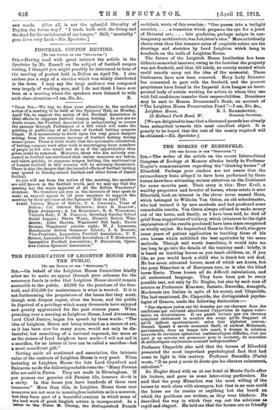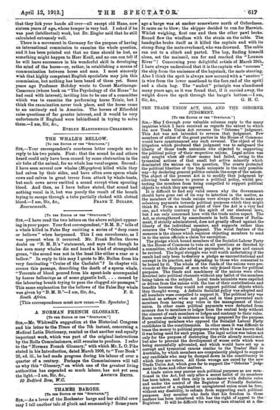THE HORSES OF ELBERFELD.
f To rtut EDITOR OP THE "SPECTATOR...1
SIE,—The writer of the article on the recent International Congress of Zoology at Monaco alludes briefly to Professor Ziegler's communication regarding the "thinking horses" of Elberfeld. Perhaps your readers are not aware that the extraordinary feats alleged to have been performed by these horses have been attracting serious attention on the Continent for some months past. Their story is this : Herr K rail, a wealthy proprietor and breeder of horses, whose estate is near Elberfeld, took an interest in the clever horse named Hans, which belonged to Wilhelm Von Osten, an old schoolmaster, who had trained it by new methods and had produced some remarkable results. Von Osten always refused to make money out of the horse, and finally, as I have been told, he died of grief from suggestions of trickery, which (whatever be the right explanation of the results produced) have been since recognized as wholly unjust. He bequeathed Hans to Herr Krall,who gave some years of patient application to teaching those of his own horses which exhibited the best aptitudes by the same methods. Though well worth describing, it would take me too long to go into the details of the training used: briefly, it is based on teaching horses as you teach children, or, if you like, as you would teach a child who is dumb but not deaf. He has seven educated horses, most of which are Arabs, but the pony Hiinschen is of European race, as is also the blind horse Berto. These horses all do difficult calculations, and all understand language. They have been put to every possible test, not only by Dr. Ziegler, but also by such men of science as Professors Kraemer, Sarasin, Besredka, Assagioli, Mackenzie (an Italian in spite of his name), and Claparede. The last-mentioned, Dr. Claparede, the distinguished psycho- logist of Geneva, made the following declaration :—
"Des reponses jastes out et6 donnees par ces chevaux dans des conditions qui excluent absolement Fhypothese de signes Toler- taires on involontaires. II me paraft certain qne cea chevaux comptent reellement le nombre des coups qu'ils frappent et gulls epelent spontanement, selon lour alphabet conven- tionnel Quant k savoir comment Zarif, et surtout Mohamed, parviennent, dans un temps tres court, k cleaner la solution corrects de certaines operations mathematiques difficiles, c'est stir quoi je no sa.urais me prononcer pour le moment; de nouvelles et methodiques experiences seraient indispensables.""
Professor Claparede also said that the horses of Elberfeld presented the most important psychological fact that had come to light in this century. Professor Besredka (Paris) wrote, "Il ne pent y avoir de doute que les chevaux raisonnent, calculent."
Dr. Ziegler dined with us at our hotel at Monte Carlo after
his lecture, and gave us some interesting particulars. He said that the pony Hanschen was the most willing of the horses to work alone with strangers, but that in no case could the horse see its master or anything but the board on which the problems are written, as they wear blinkers. He described the way in which they rap out the solutions an rapid and elegant. He told me that the horses are so friendly
that they lick your hands all over—all except old Hans, now sixteen years of age, whose temper is very bad. I asked if he was past (intellectual) work, but Dr. Ziegler said that he still calculated extremely well.
There is a movement in Germany for the purpose of having an international commission to examine the whole question, and it has been pointed out that no time should be lost, as something might happen to Herr Krall, and no one can tell if he will leave successors in his wonderful kil1 in developing the mind of the horse—or, rather, in establishing a means of communication between horse and man. I most sincerely wish that highly competent English specialists may join this commission, but nothing has been heard of them yet. Some years ago Professor Hobday wrote to Count Martinengo- Cesaresco (whose book on "The Psychology of the Horse" he had read with interest), inviting him to be one of a committee which was to examine the performing horse Trixie, but I think the examination never took place, and the horse came to an untimely end in America. The horses of Elberfeld raise questions of far greater interest, and it would be very unfortunate if England were behindhand in trying to solve them.—I am, Sir, S:C., EVELYN M ARTINESS 0- CESIIIESCO.











































 Previous page
Previous page